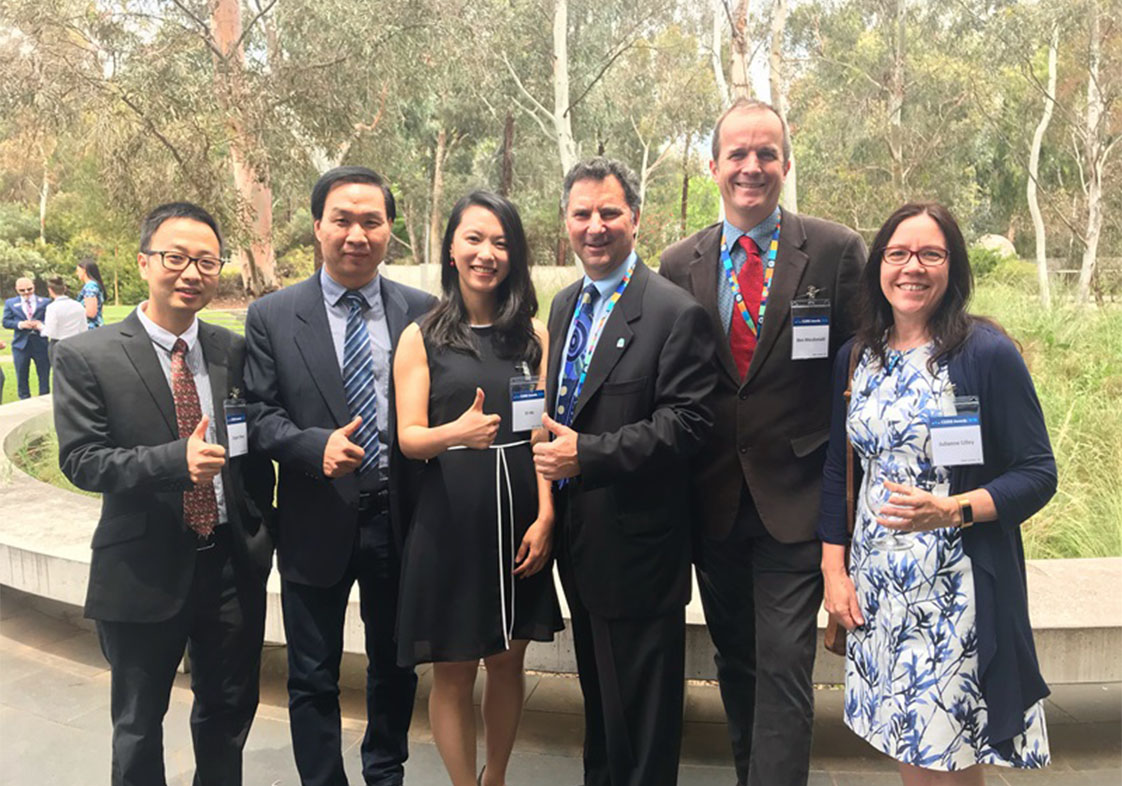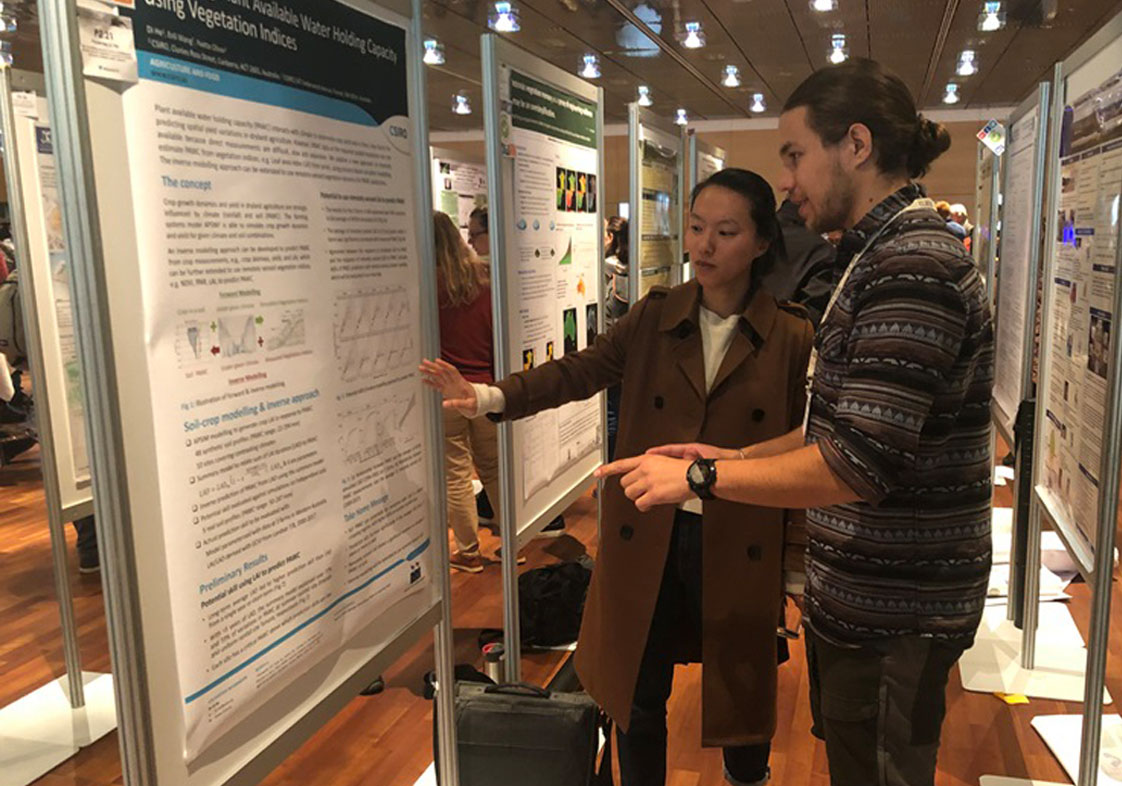Growing up in a small city in China, Dr Di He never considered that she would uncover a passion for agricultural research.
But after completing undergraduate studies and a Master degree in agrometeorology at the China Agricultural University, her enthusiasm for a career in the field was ignited.
“I became enthralled with how plants grow and how various environmental factors influence their development,” says Di.
This led to further study which opened an avenue to working with CSIRO.
“Working overseas was not something I had planned...but I was attracted to the opportunity to contribute to cutting-edge research at CSIRO,” says Di.
Her PhD in soil and plant systems modelling was supported through a joint program between CSIRO and the Chinese Ministry of Education. This meant she started her doctoral studies at CSIRO in Canberra before returning to China to complete the latter half at China Agricultural University.
And the experience at CSIRO left a lasting impression.
“I felt there was much more to learn and contribute, so when a postdoctoral opportunity arose I eagerly applied and rejoined CSIRO."
"The collaborative environment and innovative work was a rewarding challenge, solidifying my passion for agricultural science and setting the course for my career,” says Di.

A deep-rooted passion for soils and crops
Di’s postdoc research developed new approaches to predict crop yields from soil properties.
Here she applied her computer modelling skills to advance understanding of the interactions between crops and their environment.
Her success earned her the prestigious John Philip Award for the Promotion of Excellence in Young Scientists in 2018, recognising her role in improving Australia’s digital soil map.
Revolutionising the way Australia produces food, one crop at a time
Now, as a research scientist in our crop modelling team, Di is improving and applying models of cropping systems.
Using digital simulation of crop and soil processes, Di is helping design more sustainable farming systems and creating digital tools helping farmers make informed decisions to boost productivity and security in an unpredictable climate.
“Bringing in science to solve real world problems through simulation fascinates me,” Di says.
“For example, I’m developing and improving frost and heat damage predictions in crop models. This addresses a critical knowledge gap, providing benefits to growers and contributing to national food productivity.”
Supporting sustainable agricultural systems
Changing environmental conditions could threaten the longevity of farming practices as we know them.
“My work extends beyond satisfying my own research interests. It has the potential to make a significant impact on agriculture, making farming more sustainable and resilient in the face of climate change. This is incredibly motivating,” Di explains.
Recently, Di took her skills into the field at our Boorowa Agricultural Research Station.
There, she tested hypotheses on soil and plant processes in the dynamic environment of a working research farm.
“This approach tests how results from our digital tools coincide with results in real world agricultural systems and will guide our future research directions,” Di says.
The importance of connectedness
Di is also the Sustainable Agriculture Theme Champion in the CSIRO-Chinese Academy of Sciences (CAS) joint research program.
“This role helps build and strengthen global connections between Australia and China,” Di says.
As a champion, Di contributes to enhancing cultural understanding and strengthening collaborative efforts between the two countries.
“We help our research directors communicate smoothly with CAS and suggest key contacts for further collaboration in agriculture and food.”
Di was also nominated as a representative on CSIRO’s Diversity, Inclusion & Belonging Council earlier this year, and emphasises the significant role that workplace diversity plays in cultivating success.
“Diverse perspectives enhance our problem-solving capabilities and drive innovation by incorporating different approaches and ideas,” explains Di.
“The multicultural environment enriches the workplace experience.”

A place to flourish
Di recommends CSIRO for career researchers of all ages.
“It offers a range of benefits that make it an excellent place for young researchers,” says Di.
“There are a lot of professional development opportunities and training programs, and a strong sense of community and teamwork which helps researchers feel integrated and supported,” says Di.
“Young scientists are given the chance to plan their own career paths and lead key components of significant projects rather than being seen as an additional pair of hands.”
If you're looking to flourish in a career in agricultural science, check our Careers page for current opportunities.
Growing up in a small city in China, Dr Di He never considered that she would uncover a passion for agricultural research.
But after completing undergraduate studies and a Master degree in agrometeorology at the China Agricultural University, her enthusiasm for a career in the field was ignited.
“I became enthralled with how plants grow and how various environmental factors influence their development,” says Di.
This led to further study which opened an avenue to working with CSIRO.
“Working overseas was not something I had planned...but I was attracted to the opportunity to contribute to cutting-edge research at CSIRO,” says Di.
Her PhD in soil and plant systems modelling was supported through a joint program between CSIRO and the Chinese Ministry of Education. This meant she started her doctoral studies at CSIRO in Canberra before returning to China to complete the latter half at China Agricultural University.
And the experience at CSIRO left a lasting impression.
“I felt there was much more to learn and contribute, so when a postdoctoral opportunity arose I eagerly applied and rejoined CSIRO."
"The collaborative environment and innovative work was a rewarding challenge, solidifying my passion for agricultural science and setting the course for my career,” says Di.
A deep-rooted passion for soils and crops
Di’s postdoc research developed new approaches to predict crop yields from soil properties.
Here she applied her computer modelling skills to advance understanding of the interactions between crops and their environment.
Her success earned her the prestigious John Philip Award for the Promotion of Excellence in Young Scientists in 2018, recognising her role in improving Australia’s digital soil map.
Revolutionising the way Australia produces food, one crop at a time
Now, as a research scientist in our crop modelling team, Di is improving and applying models of cropping systems.
Using digital simulation of crop and soil processes, Di is helping design more sustainable farming systems and creating digital tools helping farmers make informed decisions to boost productivity and security in an unpredictable climate.
“Bringing in science to solve real world problems through simulation fascinates me,” Di says.
“For example, I’m developing and improving frost and heat damage predictions in crop models. This addresses a critical knowledge gap, providing benefits to growers and contributing to national food productivity.”
Supporting sustainable agricultural systems
Changing environmental conditions could threaten the longevity of farming practices as we know them.
“My work extends beyond satisfying my own research interests. It has the potential to make a significant impact on agriculture, making farming more sustainable and resilient in the face of climate change. This is incredibly motivating,” Di explains.
Recently, Di took her skills into the field at our Boorowa Agricultural Research Station.
There, she tested hypotheses on soil and plant processes in the dynamic environment of a working research farm.
“This approach tests how results from our digital tools coincide with results in real world agricultural systems and will guide our future research directions,” Di says.
The importance of connectedness
Di is also the Sustainable Agriculture Theme Champion in the CSIRO-Chinese Academy of Sciences (CAS) joint research program.
“This role helps build and strengthen global connections between Australia and China,” Di says.
As a champion, Di contributes to enhancing cultural understanding and strengthening collaborative efforts between the two countries.
“We help our research directors communicate smoothly with CAS and suggest key contacts for further collaboration in agriculture and food.”
Di was also nominated as a representative on CSIRO’s Diversity, Inclusion & Belonging Council earlier this year, and emphasises the significant role that workplace diversity plays in cultivating success.
“Diverse perspectives enhance our problem-solving capabilities and drive innovation by incorporating different approaches and ideas,” explains Di.
“The multicultural environment enriches the workplace experience.”
A place to flourish
Di recommends CSIRO for career researchers of all ages.
“It offers a range of benefits that make it an excellent place for young researchers,” says Di.
“There are a lot of professional development opportunities and training programs, and a strong sense of community and teamwork which helps researchers feel integrated and supported,” says Di.
“Young scientists are given the chance to plan their own career paths and lead key components of significant projects rather than being seen as an additional pair of hands.”
If you're looking to flourish in a career in agricultural science, check our Careers page for current opportunities.

